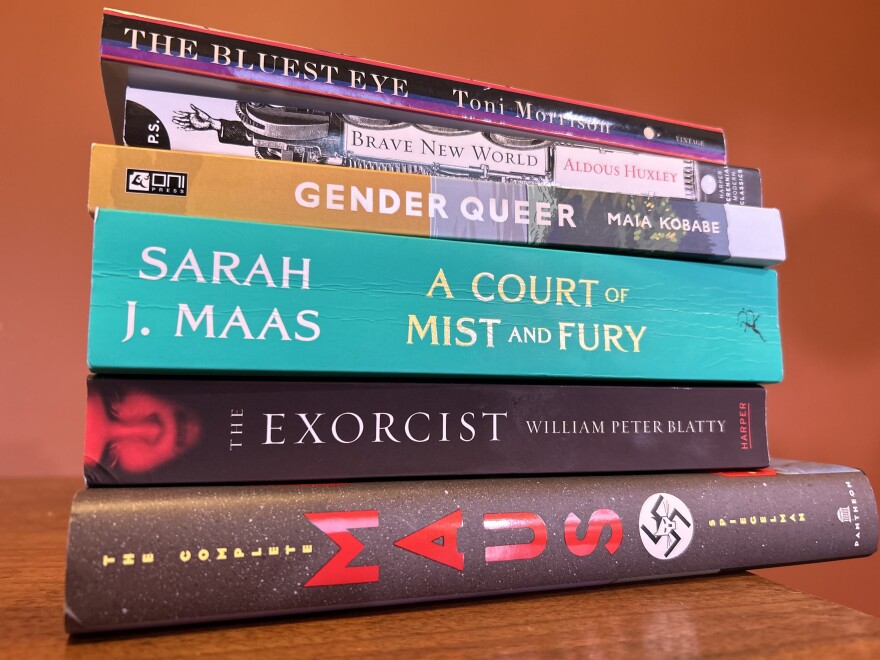A children’s picture book about a boy who likes to dress up in his mom’s clothes.
A series about a teen who rides dragons in a dystopian universe.
A graphic novel based on the diary of Anne Frank.
These are among the more than 100 books banned from libraries in Boyle County Schools.
Originally reported by The Advocate Messenger, a newspaper based in Danville, leaders in the rural central Kentucky school district pulled the titles in response to Senate Bill 150, which restricts classroom speech on gender and sexuality.
The Advocate Messenger, a Danville-based newspaper, obtained and published a list of banned titles. BCS spokesperson Susan Taylor confirmed to LPM News Thursday the list is accurate.
In a statement, BCS Superintendent Mark Wade said the decision to pull the titles was made “in response to guidance provided by the Kentucky Department of Education … to ensure compliance with the law (SB 150).”
“This was accomplished through a collaborative effort that included all school library media specialists, legal council, and our district leadership team,” Wade wrote.
SB 150 prohibits “instruction or presentation that has the goal or purpose of students studying or exploring gender identity, gender expression, or sexual orientation.” It also prohibits instruction on human sexuality or sexually transmitted diseases in grades 5 and below, and requires schools to get parental consent before offering sex education.
Wade declined an interview to further explain the decision. But in his statement, he said that library books are considered “instructional resources, and are made available to support the grade-level standards being taught.”
Other Kentucky districts have taken a different approach to implementing SB 150.
Some, like Jefferson County Public Schools and Fayette County Public Schools, have restricted sex education in the early grades, but chose not to adopt the ban on speech around gender identity and sexual orientation. Both districts say they’re also following guidance from the KDE, which says districts can choose between the two bans.
Lawmakers who support SB 150 say that KDE guidance is flawed and that they meant to ban both elementary grade sex ed and discussions about gender identity and sexual orientation across all grade levels.
Even in districts like JCPS that are not enforcing the broader speech restrictions, there has been confusion about what the law means for library books.
A JCPS elementary school librarian told LPM News district officials initially told her to pull certain titles featuring LGBTQ+ themes from the shelves in March. Later that day, the district reversed course.
In an email to LPM, KDE spokesperson Toni Konz Tatman said SB 150 “does not provide for the removal of library media resources from a school library.”
In regards to the elementary sex education restriction, Tatman said the section is “predicated on the fact that the school has a curriculum (designed learning experiences at the local level) for human sexuality or STDs.”
“This section would not impact the availability of library media resources, but may impact their use in local classroom curriculum for human sexuality or STDs,” Tatman wrote.
Likewise, Tatman said the restriction on discussing gender identity and sexual orientation also applies only when the materials are used in a “course, curriculum or program on human sexuality.”
Other than Boyle County, Tatman said KDE is not aware of any district that has removed library books due to SB 150.
The law is the subject of several legal challenges by opponents who say its restrictions on speech and LGBTQ+ young people violate the state constitution.
Which books are banned?
It is unclear why each book was found objectionable under SB 150, but many of the books banned from Boyle County Schools feature LGBTQ+ characters and themes.
“Twelfth” by Janet Key is about a twelve-year-old’s adventures at a theater camp. The protagonist has a non-binary bunkmate. It’s among 17 titles banned from Boyle County Middle Schools.
“Hurricane Child” by Kacen Callender is banned from Woodlawn Elementary School. It’s about a 12-year-old Black girl in the U.S. Virgin Islands who develops a crush on another girl. Books from the “Dune, House of Atreides” sci-fi series by Brian Herbert also made the list of 15 books banned from Woodlawn Elementary.
Junction City Elementary School has removed the last book in the “Captain Underpants” series, along with picture books like “Fred Gets Dressed,” which features a boy who likes to try on his mother’s clothes. The “Battle Dragons” fantasy series by Alex London is no longer allowed at the school.
“Anne Frank” by Sid Jacobson is also banned from Junction City Elementary. It’s a graphic novel based on Anne Frank’s “Diary of a Young Girl” and depicts the teen’s hiding during Nazi occupation of the Netherlands.
Fifty-five titles have been removed from Boyle County High School. They include many nonfiction books on LGBTQ+ identities, such as “Teens and LGBT Issues,” by Christine Wilcox and “Stonewall: Breaking Out in the Fight for Gay Rights,” by Ann Bausum.
The library also removed educational materials with titles like “Defining Sexual Consent” and “Unplanned Pregnancies.”
The removals come as book bans and challenges continue to rise nationally, usually over objections to claims that certain books contain sexually explicit material. The most frequently targeted books feature LGBTQ+ themes, or center on the experiences of people of color.
Here is a link to a list of the banned books, originally obtained by The Advocate Messenger.
Support for this story was provided in part by the Jewish Heritage Fund.






